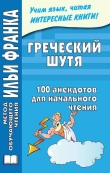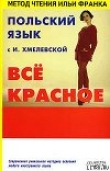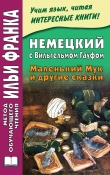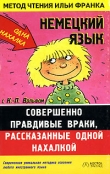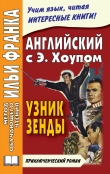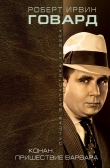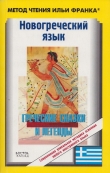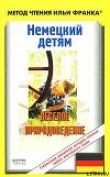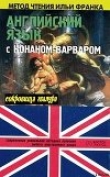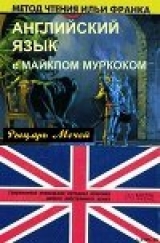
Текст книги "Английский язык с М. Муркоком"
Автор книги: Майкл Джон Муркок
Соавторы: Илья Франк,Андрей Еремин
Жанры:
Языкознание
,сообщить о нарушении
Текущая страница: 14 (всего у книги 36 страниц)
CHAPTER NINE (глава девятая)
Concerning Love and Hatred (о любви и ненависти)
concerning – относительно, касательно
Although doubtless magnificent by Mabden standards (хотя и, несомненно, великолепный по меркам мабденов; standard – стандарт, норма, образец), the Margravine's castle struck Prince Corum as simple and pleasant (замок маркграфини поразил Корума как простой и приятный = простотой и уютной атмосферой). At her invitation, he allowed himself to be bathed and oiled by castle servants (по ее предложению, он позволил себе быть вымытым = чтобы его вымыли и натерли благовониями слуги замка; invitation – приглашение; предложение; to oil – смазывать, пропитывать маслом) and was offered a selection of clothing to wear (и /ему/ предложили /на выбор/ много одежды, /чтобы носить/; selection – выбор, набор). He chose a samite shirt of dark blue (он выбрал парчовую рубаху темно-синего /цвета/; to choose), embroidered in a design of light blue (украшенную вышивкой светло-голубого /оттенка/; design – рисунок, узор; эскиз), a pair of brown linen breeks (/и/ пару штанов из коричневого полотна; linen – /льняное/ полотно; парусина, холст). The clothes fitted him well (одежда оказалась ему впору; to fit – быть впору, подходить).
`They were the Margrave's (они = эти вещи принадлежали маркграфу), a girl servant told him shyly, not looking at him directly (юная служанка сказала ему застенчиво, не глядя прямо на него; girl – девочка, девушка; служанка).
None of the servants had seemed at ease with him (никто из слуг не казался = не чувствовал себя свободно с ним). He guessed that his appearance was repellent to them (он догадался, что его внешность отталкивает их; repellent – отталкивающий, вызывающий отвращение).
magnificent [mæɡˈnɪfɪs (ə) nt] pleasant [ˈplez (ə) nt] invitation [, ɪnvɪˈteɪʃ (ə) n] guessed [ɡest] repellent [rɪˈpelənt]
Although doubtless magnificent by Mabden standards, the Margravine's castle struck Prince Corum as simple and pleasant. At her invitation, he allowed himself to be bathed and oiled by castle servants and was offered a selection of clothing to wear. He chose a samite shirt of dark blue, embroidered in a design of light blue, a pair of brown linen breeks. The clothes fitted him well.
`They were the Margrave's, a girl servant told him shyly, not looking at him directly.
None of the servants had seemed at ease with him. He guessed that his appearance was repellent to them.
Reminded of this, he asked the girl (поэтому, он попросил девушку; to remind – напоминать):
`Would you bring me a mirror (не принесешь ли ты мне зеркало)?
`Aye, lord (да, господин). She ducked her head and left the chamber (она наклонила голову и вышла из комнаты; to duck – быстро наклонять /голову/; уклоняться).
But it was the Margravine herself who returned with the mirror (но сама маркграфиня вернулась с зеркалом). She did not hand it to him immediately (она не подала его ему сразу).
`Have you not seen your face since it was injured (разве ты не видел своего лица после того, как оно было повреждено)? she asked.
He shook his head (он /отрицательно/ покачал головой; to shake).
`You were handsome (ты был хорош собой; handsome – красивый, статный /о мужчине/)?
`I do not know (не знаю).
mirror [ˈmɪrə] immediately [ɪˈmi:dɪətlɪ] injured [ˈɪnʤəd]
Reminded of this, he asked the girl:
`Would you bring me a mirror?
`Aye, lord. She ducked her head and left the chamber.
But it was the Margravine herself who returned with the mirror. She did not hand it to him immediately.
`Have you not seen your face since it was injured? she asked.
He shook his head.
`You were handsome?
`I do not know.
She looked at him frankly (она посмотрела на него откровенно).
`Yes, she said. `You were handsome.
Then she gave him the mirror (затем она дала ему зеркало).
The face he saw was framed by the same light golden hair (лицо, /которое/ он увидел, было обрамлено теми же легкими золотыми волосами), but it was no longer youthful (но оно больше не было юным). Fear and agony had left their marks (страх и страдания оставили свои отпечатки/следы; to leave). The face was lined and hard (лицо было испещрено морщинами и сурово) and the set of the mouth grim (губы жестоко искривились; set – положение, позиция частей тела; осанка; grim – жестокий, беспощадный; мрачный). One eye of gold and purple stared bleakly back at him (единственный золотисто-фиолетовый глаз смотрел мрачно на него). The other socket was an ugly hole made up of red, stained tissue (другая глазница представляла собой уродливую яму, состоявшую из красной, пятнистой ткани; socket – впадина, углубление; розетка; hole – дыра, отверстие; воронка; stained – в пятнах; окрашенный). There was a small scar on his left cheek and another on his neck (один маленький шрам был на его левой щеке, а другой – на шее). The face was still characteristically a Vadhagh face (лицо по-прежнему было типичным лицом вадага), but it had suffered abuse never suffered by a Vadhagh before (но оно перенесло /такое/ страдание, /которое/ никогда не знал /ни один/ вадаг раньше; to suffer – страдать, испытывать, подвергнуться; abuse – плохое, жестокое обращение; избиение). From the face of an angel it had been transformed by Glandyth's knives and irons into the face of a demon (из лика ангела оно было превращено ножами Гландита и /раскаленным/ железом в лицо демона).
tissue [ˈtɪʃu:] abuse [əˈbju:s] angel [ˈeɪnʤ (ə) l] demon [ˈdi:mən]
She looked at him frankly.
`Yes, she said. `You were handsome.
Then she gave him the mirror.
The face he saw was framed by the same light golden hair, but it was no longer youthful. Fear and agony had left their marks. The face was lined and hard and the set of the mouth grim. One eye of gold and purple stared bleakly back at him. The other socket was an ugly hole made up of red, stained tissue. There was a small scar on his left cheek and another on his neck. The face was still characteristically a Vadhagh face, but it had suffered abuse never suffered by a Vadhagh before. From the face of an angel it had been transformed by Glandyth's knives and irons into the face of a demon.
Silently, Corum gave her back the mirror (молча, Корум отдал ей назад = вернул зеркало).
He passed his good hand over the scars of his face and he brooded (он провел здоровой рукой по шрамам своего лица и сказал грустно; to brood – грустно размышлять).
`If I was handsome, I am ugly now (если я /и/ был красив, /то/ я уродлив теперь).
She shrugged (она пожала плечами).
`I have seen much worse (я видела намного хуже).
Then the rage began to fill him again (затем = и тут ярость начала наполнять его снова) and his eye blazed and he shook the stump of his hand and he shouted at her (его глаз сверкнул и он затряс обрубком руки и крикнул на нее /Ралину/).
silently [ˈsaɪləntlɪ] scar [skɑ:] shouted [ˈʃautɪd]
Silently, Corum gave her back the mirror.
He passed his good hand over the scars of his face and he brooded.
`If I was handsome, I am ugly now.
She shrugged.
`I have seen much worse.
Then the rage began to fill him again and his eye blazed and he shook the stump of his hand and he shouted at her.
`Aye, and you will see much worse when I have done with Glandyth-a-Krae (да, и ты увидишь гораздо хуже = уродливее, когда я разделаюсь с Гландитом-а-Краэ)!
Surprised, she recoiled from him and then regained her composure (пораженная, она отпрянула от него, но затем вновь вернула свое самообладание = взяла себя в руки; to recoil – отскочить, отшатнуться).
`If you did not know you were handsome (если ты не знал, что красив), if you were not vain (если ты не был тщеславен), then why has this affected you so much (тогда почему это = шрамы подействовали на тебя так сильно)?
`I need my hands and my eyes so that I may kill Glandyth and watch him perish (мне нужны мои руки и глаза, чтобы я мог убить Гландита и смотреть, как он умрет). With only half of these, I lose half the pleasure (лишь с половиной из них = с одной рукой и с одним глазом я потеряю половину радости/удовольствия)!
`That is a childish statement, Prince Corum (это несерьезное утверждение, принц Корум; childish – детский, ребяческий). It is not worthy of a Vadhagh (оно недостойно вадага). What else has this Glandyth done (что еще этот Гландит сделал /тебе/)?
composure [kəmˈpəuʒə] pleasure [ˈpleʒə] worthy [ˈwə: ðɪ]
`Aye, and you will see much worse when I have done with Glandyth-a-Krae!
Surprised, she recoiled from him and then regained her composure.
`If you did not know you were handsome, if you were not vain, then why has this affected you so much?
`I need my hands and my eyes so that I may kill Glandyth and watch him perish. With only half of these, I lose half the pleasure!
`That is a childish statement, Prince Corum. It is not worthy of a Vadhagh. What else has this Glandyth done?
Corum realised that he had not told her (Корум понял, что он не рассказал ей /того/), that she would not know, living in this remote place (чего она не знала, живя в этом отдаленном месте), as cut off from the world as any Vadhagh had been (так же отрезанная от мира, как и любой вадаг жил /когда-то/).
`He has slain all the Vadhagh (он убил всех вадагов; to slay), he said. `Glandyth has destroyed my race and would have destroyed me (уничтожил мой народ и уничтожил бы меня) if it had not been for your friend, the Giant of Laahr (если бы не твой друг, Великан из Лаара).
`He has done what (он сделал что) … Her voice was faint (ее голос был слабым). She was plainly shocked (она явно была потрясена).
`He has put all my folk to death (он убил всех моих родных; to put to death – лишить жизни, казнить, убить; death – смерть).
`For what reason (но зачем: «по какой причине»)? Have you been warring with this Glandyth (вы воевали с этим Гландитом)?
realised [ˈrɪəlaɪzd] death [deƟ] reason [ri:zn]
Corum realised that he had not told her, that she would not know, living in this remote place, as cut off from the world as any Vadhagh had been.
`He has slain all the Vadhagh, he said. `Glandyth has destroyed my race and would have destroyed me if it had not been for your friend, the Giant of Laahr.
`He has done what… Her voice was faint. She was plainly shocked.
`He has put all my folk to death.
`For what reason? Have you been warring with this Glandyth?
`We did not know of his existence (мы /даже/ не знали о его существовании). It did not occur to us to guard against the Mabden (нам и в голову не приходило остерегаться мабденов; to guard against – остерегаться, защищаться от). They seemed so much like brutes (они казались так сильно похожими на животных), incapable of harming us in our castles (неспособных повредить нам в наших замках; to harm – причинять вред; наносить ущерб). But they have razed all our castles (но они разрушили все наши замки; to raze – разрушать до основания, сносить). Every Vadhagh save me is dead (каждый вадаг = все вадаги, кроме меня, мертвы) and most of the Nhadragh, I learned, who are not their cringing slaves (и большинство надрагов /тоже/, /как/ я узнал, /кроме тех/, кто является их рабами; to cringe – раболепствовать, пресмыкаться).
`Are these the Mabden whose king is called Lyr-a-Brode of Kalenwyre (это не те ли мабдены, чей король зовется Лир-а-Брод из Каленуира)?
`They are (это они).
`I, too, did not know they had become so powerful (я тоже не знала, /что/ они стали столь могущественными).
existence [ɪɡˈzɪst (ə) ns] guard [ɡɑ:d] incapable [ɪnˈkeɪpəbl] cringing [ˈkrɪnʤɪŋ]
`We did not know of his existence. It did not occur to us to guard against the Mabden. They seemed so much like brutes, incapable of harming us in our castles. But they have razed all our castles. Every Vadhagh save me is dead and most of the Nhadragh, I learned, who are not their cringing slaves.
`Are these the Mabden whose king is called Lyr-a-Brode of Kalenwyre?
`They are.
`I, too, did not know they had become so powerful.
I had assumed that it was the Pony Tribes who had captured you (я полагала, что это племена на пони захватили тебя). I wondered why you were travelling alone so far from the nearest Vadhagh castle (я удивилась, почему ты путешествовал один так далеко от ближайшего вадагского замка).
`What castle is that (что это за замок)? For a moment Corum hoped that there were Vadhagh still alive (на мгновение Корум надеялся = вспыхнула надежда, что есть вадаги, /которые/ еще живы), much further West than he had guessed (/живущие/ намного западнее, чем он предполагал; to guess – гадать, догадываться; считать).
`It is called Castle Eran – Erin – some such name (он называется замок Эран – Эрин – какое-то такое название).
`Erorn?
`Aye. That sounds the right name (это звучит правильным названием = именно так). It is over five hundred miles from here (/до/ него более пятисот миль отсюда) …
assumed [əˈsju:md] captured [ˈkæpʧəd] castle [kɑ:sl] guessed [ɡest]
I had assumed that it was the Pony Tribes who had captured you. I wondered why you were travelling alone so far from the nearest Vadhagh castle.
`What castle is that? For a moment Corum hoped that there were Vadhagh still alive, much further West than he had guessed.
`It is called Castle Eran – Erin – some such name.
`Erorn?
`Aye. That sounds the right name. It is over five hundred miles from here…
`Five hundred miles? Have I come so far (неужели я пришел = оказался так далеко)? The Giant of Laahr must have carried me much further than I suspected (Великан из Лаара, должно быть, унес меня намного дальше, чем я предполагал). That castle you mention, my lady, was our castle (тот замок, /что/ ты упомянула, моя леди, был нашим замком = моих родных). The Mabden destroyed it (мабдены уничтожили его). It will take me longer than I thought to return and find Earl Glandyth and his Denledhyssi (это займет у меня больше /времени/, чем я думал, чтобы вернуться и найти графа Гландита и его денледисси).
Suddenly Corum realised just how alone he was (вдруг Корум осознал, насколько он одинок; just – точно, именно; только что; совершенно, просто /в качестве усиления/). It was as if he had entered another plane of Earth (это было, словно он проник в другую плоскость Земли) where everything was alien to him (где все было чуждо ему; alien – иностранный, чуждый, несвойственный). He knew nothing of this world (он ничего не знал об этом мире). A world in which the Mabden ruled (мире, в котором правили мабдены). How proud his race had been (сколь гордой была его раса/народ). How foolish (сколь глупой). If only they had concerned themselves with knowledge of the world around them (если бы только они получали знания = изучали /реальный/ мир вокруг себя; to concern oneself with something – заниматься чем-либо, интересоваться чем-либо) instead of seeking after abstractions (вместо поиска абстракций; to seek after – добиваться чего-то, стремиться к чему-то).
Corum bowed his head (опустил голову; to bow – гнуть/ся/; наклонять голову).
alien [ˈeɪlɪən] proud [praud] instead [ɪnˈsted] bowed [baud]
`Five hundred miles? Have I come so far? The Giant of Laahr must have carried me much further than I suspected. That castle you mention, my lady, was our castle. The Mabden destroyed it. It will take me longer than I thought to return and find Earl Glandyth and his Denledhyssi.
Suddenly Corum realised just how alone he was. It was as if he had entered another plane of Earth where everything was alien to him. He knew nothing of this world. A world in which the Mabden ruled. How proud his race had been. How foolish. If only they had concerned themselves with knowledge of the world around them instead of seeking after abstractions.
Corum bowed his head.
The Margravine Rhalina seemed to understand his emotion (маркграфиня Ралина, казалось, поняла его чувство = душевное состояние). She lightly touched his arm (она легко коснулась его руки).
`Come, Prince of Vadhagh. You must eat (ты должен поесть).
He allowed her to lead him from the room and into another (он позволил ей вести себя = пошел покорно за ней из этой комнаты в другую) where a meal had been laid out for them both (где пища была выставлена /на столе/ = приготовлена для них обоих; to lay out – выкладывать, выставлять). The food – mainly fruit and forms of edible seaweed (пища – в основном фрукты и разновидности съедобных /морских/ водорослей; seaweed: sea – море; weed – сорная трава, сорняк) – was much closer to his taste (была намного ближе к его вкусу = больше подходила ему) than any Mabden food he had seen previously (чем любая мабденская еда, которую он видел раньше). He realised that he was very hungry and that he was deeply tired (он понял, что очень голоден и смертельно устал; deeply – глубоко; крайне, в высокой степени). His mind was confused (его душа была в смятении; mind – разум, ум; дух, душа; расположение духа; to confuse – смущать, приводить в беспорядок) and his only certainty was the hatred he still felt for Glandyth (и его единственной уверенностью было = он был уверен лишь в своей ненависти, /которую/ по-прежнему чувствовал к Гландиту) and the vengeance he intended to take as soon as possible (и в /жажде/ мести, /которую/ он намеревался осуществить как можно скорее).
edible [ˈedɪbl] confused [kənˈfju:zd] hatred [ˈheɪtrɪd] vengeance [ˈvenʤ (ə) ns]
The Margravine Rhalina seemed to understand his emotion. She lightly touched his arm.
`Come, Prince of Vadhagh. You must eat.
He allowed her to lead him from the room and into another where a meal had been laid out for them both. The food – mainly fruit and forms of edible seaweed – was much closer to his taste than any Mabden food he had seen previously. He realised that he was very hungry and that he was deeply tired. His mind was confused and his only certainty was the hatred he still felt for Glandyth and the vengeance he intended to take as soon as possible.
As they ate, they did not speak (когда они ели, они не разговаривали; to eat), but the Margravine watched his face the whole time (но маркграфиня смотрела ему в лицо все время) and once or twice she opened her lips as if to say something (и раз или два открывала губы, словно чтобы сказать что-то), but then seemed to decide against it (но потом, казалось, передумывала; to decide against – решить не делать что-то).
The room in which they ate was small (комната, в которой они ели, была небольшой) and hung with rich tapestries covered in fine embroidery (увешанной роскошными гобеленами с изящной/тонкой вышивкой; to cover – накрывать, покрывать; скрывать). As he finished his food and began to observe the details of the tapestry (когда он закончил с едой и начал рассматривать детали/элементы гобелена; to observe – наблюдать, вести /научные/ наблюдения; подмечать), the scenes thereon began to swim before his eyes (сцены, /изображенный/ на нем, стали расплываться у него перед глазами; thereon – на т ом, на этом; to swim – плавать, плыть; кружиться /о голове/). He looked questioningly at the Margravine, but her face was expressionless (он посмотрел вопросительно на маркграфиню, но ее лицо было спокойным; expressionless – невыразительный; expression – выражение). His head felt light and he had lost the use of his limbs (его голова ощущала легкость, а он потерял способность пользоваться своими конечностями = руки и ноги отказывались повиноваться; use – применение, /ис/пользование; способность или право пользования).
He tried to form words (он попытался произнести слова = заговорить; to form – придавать форму, строить, создавать), but they would not come (но слова не шли).
He had been drugged (его отравили; to drug – подмешивать яд или наркотики в пищу; давать наркотики).
embroidery [ɪmˈbrɔɪd (ə) rɪ] scene [si:n] questioningly [ˈkwesʧ (ə) nɪŋlɪ] limb [lɪm]
As they ate, they did not speak, but the Margravine watched his face the whole time and once or twice she opened her lips as if to say something, but then seemed to decide against it.
The room in which they ate was small and hung with rich tapestries covered in fine embroidery. As he finished his food and began to observe the details of the tapestry, the scenes thereon began to swim before his eyes. He looked questioningly at the Margravine, but her face was expressionless. His head felt light and he had lost the use of his limbs.
He tried to form words, but they would not come.
He had been drugged.
The woman had poisoned his food (женщина отравила его пищу).
Once again he had allowed himself to become a victim of the Mabden (снова он позволил себе стать жертвой мабденов). He rested his head on his arms (он положил голову на руки; to rest – покоиться, лежать; класть, прислонять) and fell, unwillingly, into a deep sleep (и погрузился, не желая того, в глубокий сон; unwillingly – неохотно, против воли).
Corum dreamed again (Корум снова увидел сон).
He saw Castle Erorn as he had left it when he had first ridden out (он видел замок Эрорн /таким/, каким он покинул его, когда впервые выехал = отправился в путь). He saw his father's wise face speaking (он увидел мудрое лицо отца, говорившего /что-то/) and strained to hear the words, but could not (и напряг /слух/, чтобы услышать слова, но не смог; to strain – напрягать/ся/). He saw his mother at work (он увидел свою мать за работой), writing her latest treatise on mathematics (писавшую свой последний труд по математике; treatise – трактат, научный труд). He saw his sisters dancing to his uncle's new music (он увидел своих сестер, танцевавших под новую музыку его дяди).
The atmosphere was joyful (атмосфера была радостной/счастливой).
treatise [ˈtri:tɪz] mathematics [, mæƟɪˈmætɪks] uncle [ʌŋkl] atmosphere [ˈætməsfɪə]
The woman had poisoned his food.
Once again he had allowed himself to become a victim of the Mabden. He rested his head on his arms and fell, unwillingly, into a deep sleep.
Corum dreamed again.
He saw Castle Erorn as he had left it when he had first ridden out. He saw his father's wise face speaking and strained to hear the words, but could not. He saw his mother at work, writing her latest treatise on mathematics. He saw his sisters dancing to his uncle's new music.
The atmosphere was joyful.
But now he realised that he could not understand their activities (но теперь он осознал, что не может понять их занятий). They seemed strange and pointless to him (они = их занятия казались ему странными и бессмысленными). They were like children playing, unaware that a savage beast stalked them (они были, словно играющие дети, не подозревающие, что дикий/свирепый зверь подкрался к ним; to stalk – подкрадываться; скрыто преследовать).
He tried to cry out – to warn them – but he had no voice (он попытался закричать – чтобы предупредить их – но у него не было голоса).
He saw fires begin to spring up in rooms (он видел, как огни = языки пламени начинают охватывать комнаты; to spring up – возникать; быстро расти) – saw Mabden warriors who had entered the unprotected gates (видел мабденских воинов, которые вошли через незащищенные ворота) without the inhabitants being in the least aware of their presence (без обитателей, хоть немного осознающих их присутствие = никто в замке ни о чем не подозревал; to be aware of – знать о, осознавать). Laughing among themselves (посмеиваясь /между собой/), the Mabden put the silk hangings and the furnishings to the torch (мабдены поджигали шелковые портьеры и мебель /факелом/; to put to the torch – предать огню; furnishings – предметы мебели, домашние принадлежности).
Now he saw his kinfolk again (теперь он увидел своих родных снова). They had become aware of the fires and were rushing to seek their source (они поняли, что /в замке/ пожар и бросились искать его источник; to become aware – ощущать; осознавать, понимать; to rush – бросаться, устремляться).
savage [ˈsævɪʤ] stalked [stɔ:kt] presence [ˈprez (ə) ns] source [sɔ:s]
But now he realised that he could not understand their activities. They seemed strange and pointless to him. They were like children playing, unaware that a savage beast stalked them.
He tried to cry out – to warn them – but he had no voice.
He saw fires begin to spring up in rooms – saw Mabden warriors who had entered the unprotected gates without the inhabitants being in the least aware of their presence. Laughing among themselves, the Mabden put the silk hangings and the furnishings to the torch.
Now he saw his kinfolk again. They had become aware of the fires and were rushing to seek their source.
His father came into a room in which Glandyth-a-Krae stood (его отец вошел в комнату, в которой Гландит-а-Краэ стоял; to stand), hurling books on to a pyre he had erected in the middle of the chamber (швыряя книги в костер, /который/ развел в центре комнаты; pyre – погребальный костер; to erect – сооружать, возводить). His father watched in astonishment as Glandyth burned the books (его отец смотрел в изумлении, как Гландит сжигает книги). His father's lips moved and his eyes were questioning – almost polite surprise (губы отца шевелились, а глаза спрашивали = в глазах застыл вопрос – почти вежливое удивление). Glandyth turned and grinned at him (обернулся и ухмыльнулся ему), drawing his axe from his belt (вытаскивая топор из-за пояса). He raised the axe (он занес топор) …
Now Corum saw his mother (затем Корум увидел свою мать). Two Mabden held her while another heaved himself up and down on her naked body (двое мабденов держали ее, пока еще один = третий поднимался и опускался над ее обнаженным телом).
Corum tried to enter the scene, but something stopped him (Корум попытался проникнуть туда, но что-то остановило его; scene – место действия, события).
pyre [ˈpaɪə] polite [pəˈlaɪt] heaved [hi:vd] scene [si:n]
His father came into a room in which Glandyth-a-Krae stood, hurling books on to a pyre he had erected in the middle of the chamber. His father watched in astonishment as Glandyth burned the books. His father's lips moved and his eyes were questioning – almost polite surprise. Glandyth turned and grinned at him, drawing his axe from his belt. He raised the axe…
Now Corum saw his mother. Two Mabden held her while another heaved himself up and down on her naked body.
Corum tried to enter the scene, but something stopped him.
He saw his sisters and his cousin suffering the same fate as his mother (он видел своих сестер и кузину, разделивших участь его матери; to suffer – страдать, испытывать; fate – судьба; доля, жребий). Again his path to them was blocked by something invisible (снова его путь к ним был прегражден чем-то невидимым).
He struggled to get through (он пытался пробиться /к ним/; to struggle – бороться; стараться изо всех сил; to get through – пройти через что-либо), but now the Mabden were slitting the girls' throats (но теперь мабдены перерезали девушкам горло; to slit – разрезать в длину, вдоль). They quivered and died like slain fawns (они дрожали /в судорогах/ и умирали, словно прирезанные козочки; to quiver – дрожать, трястись; fawn – молодой олень; детеныш /зверя/).
Corum began to weep (Корум начал плакать).
He was still weeping, but he lay against a warm body (он по-прежнему плакал, но лежал /теперь/ рядом с /чьим-то/ теплым телом) and from somewhere in the distance came a soothing voice (и откуда-то издалека доносился утешающий голос).
cousin [kʌzn] invisible [ɪnˈvɪzəbl] quivered [ˈkwɪvəd] fawn [fɔ:n]
He saw his sisters and his cousin suffering the same fate as his mother. Again his path to them was blocked by something invisible.
He struggled to get through, but now the Mabden were slitting the girls' throats. They quivered and died like slain fawns.
Corum began to weep.
He was still weeping, but he lay against a warm body and from somewhere in the distance came a soothing voice.
His head was being stroked (его гладила по голове) and he was being rocked back and forth in a soft bed by the woman (и качала вперед-назад = убаюкивала в мягкой постели женщина) on whose breast he lay (на чьей груди он лежал).
For a moment he tried to free himself, but she held him tight (на миг он попытался высвободиться /из ее объятий/, но она держала его крепко).
He began to weep again, freely this time (он снова заплакал, легко = от облегчения на этот раз), great groans racking his body, until he slept again (сильные рыдания изнуряли его тело, пока он не уснул снова; groan – стон, тяжелый вздох; to rack – истощать, изнурять). And now the sleep was free from dreams (и теперь его сон был свободен от сновидений) …
He awoke feeling anxious (он проснулся, ощущая беспокойство; to awake; anxious – тревожный, беспокойный). He felt that he had slept for too long (он чувствовал, что проспал слишком долго), that he must be up and doing something (что он должен встать и сделать что-то = начать действовать). He half raised himself in the bed (он приподнялся: «наполовину поднял себя» в кровати) and then sank down again into the pillows (затем упал снова на подушки; to sink).
breast [brest] anxious [ˈæŋkʃəs]
His head was being stroked and he was being rocked back and forth in a soft bed by the woman on whose breast he lay.
For a moment he tried to free himself, but she held him tight.
He began to weep again, freely this time, great groans racking his body, until he slept again. And now the sleep was free from dreams…
He awoke feeling anxious. He felt that he had slept for too long, that he must be up and doing something. He half raised himself in the bed and then sank down again into the pillows.
It slowly came to him that he was much refreshed (медленно ему стало ясно, что его силы значительно восстановились; to refresh – восстанавливать силы; освежать/ся/, подкреплять/ся/). For the first time since he had set off on his quest (впервые после того, как он отправился на поиски), he felt full of energy and well-being (Корум почувствовал себя полным энергии и здоровья; well-being – здоровье, хорошее самочувствие; благополучие). Even the darkness in his mind seemed to have retreated (даже тьма в его душе, казалось, отступила).
So the Margravine had drugged him (итак, маркграфиня что-то подмешала ему в пищу), but now, it seemed, it had been a drug to make him sleep (лишь теперь, по-видимому = стало ясно, что это было снадобье, чтобы усыпить его; drug – медикамент, снадобье), to help him regain his strength (помочь ему восстановить силы).
